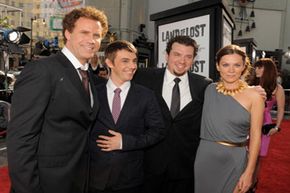2009 was an unpredictable year for the film industry. The $100 million Will Ferrell vehicle "Land of the Lost," brought in a meager $65 million in worldwide box office receipts, while the sleeper hit "Paranormal Activity," made for $10,000 in relative pocket change, broke the $100 million mark. Meanwhile, James Cameron's latest movie "Avatar" is receiving more media attention over its bloated budget -- a projected $500 million -- than its groundbreaking special effects.
If a movie's price tag has little or no correlation to its profitability, then why the heck do movies cost so much -- an average of over $100 million at last count [source: MPAA]? The short answer: because they can.
Advertisement
It all comes down to a financial concept known as Parkinson's Law, which explains, among other things, that film budgets will always expand to "fully absorb the capital available," whether or not that extra cash results in a better or better-selling product [source: Vogel].
During the economic boom of the mid-2000s, Hollywood was flush with cash -- other people's cash, that is. Wall Street hedge funds partnered with big investment banks like Lehman Brothers and Goldman Sachs to pump $15 billion into Hollywood films between 2005 and 2008 [source: Zeidler].
Outside investors rushed to Hollywood largely because of a new payment structure that gave them a cut of a film's total profits over its product lifetime. These profits include box office sales, as well as video on demand, DVDs, domestic and foreign TV licensing, in-flight movies, product placement and toy licensing [source: Epstein]. In the early 2000s, the average rate of return on a studio movie was a whopping 15 percent. Breakout hits repaid 23 to 28 percent.
Wall Street treated Hollywood movies the same way it treated mortgage assets during the real estate boom. Firms packaged packages, or slates, of studio movies into securities that they resold to investors. When mortgage-backed assets began to lose value in the mid-2000s, hedge funds funneled even more money into movies [source: Galloway].
With so much money coming in from outside investors, studios could spend less of their own cash on each film, while still taking a 10 percent "distribution fee" off the top -- a perk they don't share with the banks [source: Epstein].
According to Parkinson's Law, more money means more (and more expensive) movies.
The half-billion-dollar "Avatar" received 60 percent of its backing from non-studio sources, which makes it much less of a gamble for the nervous accountants at 20th Century Fox, but still one very pricey popcorn flick [source: Cieply].
Now that we know where the money comes from, let's take a look at how it's spent.
Advertisement


